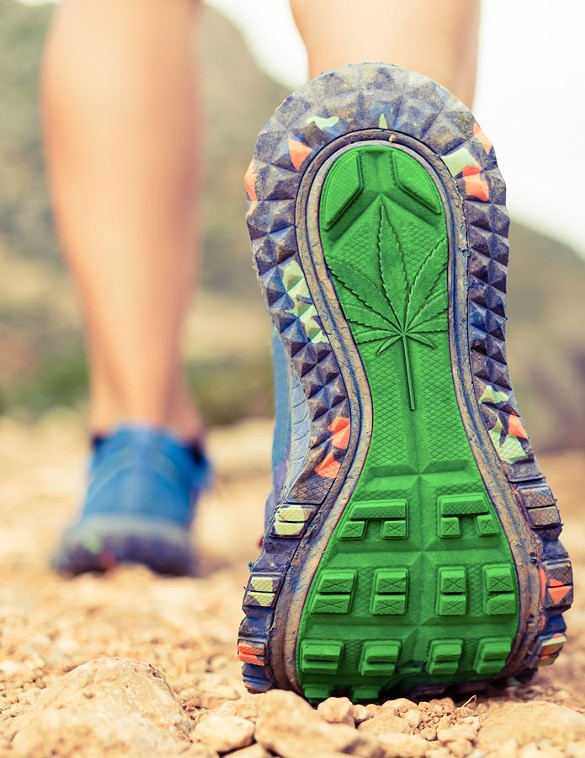You are here
Home 🌿 Medical Cannabis News 🌿 Does Cannabis Boost Athletic Performance? Anecdote Says More Than Science, for Now 🌿Does Cannabis Boost Athletic Performance? Anecdote Says More Than Science, for Now

In Colorado, we pride ourselves on being physically fit and active.
There is no other state in the union where hiking 14,000-foot mountains is an unexceptional hobby, or where most of the population understands the phrase “baggin’ ’teeners.” On top of being a state filled with trim bodies, we’re also a state full of trim marijuana. But how does recreational weed — a sub- stance typically associated with lazy, pot-bellied stoners eating potato chips on bean bag couches — fit into our self-image of a state filled with sexy hiker bodies with abs as solid as the rocks we climb?
Local cannabis expert and former pharmacist Dean Frankmore was very excited to try to answer that question, continually describing weed’s interaction with the body as a relationship. “Cannabis isn’t just gonna hand you everything, there’s gonna be some give and take there,” he says. “If you use it for depression, I recommend you do therapy as well ... One toke or one session — you can’t judge just from that whether or not it’s gonna be helpful for you.”
And, if you’re going to start using weed as an athletic performance enhancer, then you have to ask yourself what exactly you’re trying to get from it.
What does he get from it? “For me it feels like my mind turns on a little bit more,” Frankmore says. “I feel more receptive and absorb what’s around me more.”
Contrary to popular stereotypes, Frankmore believes consuming cannabis can be a motivator. Getting high can get us off the couch and to the gym when we’re feeling lazy, he says, but we have to be open to it. Asked which strains he finds motivating, he recommends sativas, as they’re generally more of an upper, more of a head high. Though Frankmore himself prefers indica/sativa hybrids, when it really comes down to it, he pays less attention to strains and more to intent. “If I want to go hike a mountain, any strain will really help,” he says.
Anecdotally, Frankmore’s take rings true. He’s hardly the only marijuana activist extolling the benefits of the long-stigmatized plant. But, where’s the concrete evidence?
There hasn’t been much scientific research to clarify the effect of cannabis on athletic performance. In fact, there’s not much research on human consumption of cannabis at all — it still being a federally illegal substance.
That’s where Jennifer Mullen, interim director of the Cannabis Research Institute of Colorado (CRIC) steps in to talk about what direction the science of cannabis is heading. Located at Colorado State University at Pueblo, CRIC was founded in June 2016. It’s funded primarily by the state of Colorado and Pueblo County, with 10 multidisciplinary studies on various aspects of canna- bis now underway.
“We think the [Institute] is uniquely positioned to do pressing research into cannabis applications,” Mullen says.
Currently, the only study conducted with human subjects concerns epileptic patients whose seizures are not being controlled through regular medicines. Other studies include biological research on viruses and probiotics, genome testing on plants, neuroscientific study of cognition, as well as research into industrial applications of hemp.
Asked about the possibility of future research on cannabis as fitness boost- er, Mullen was vague, saying, “Conclusions are a long way off. People want research talking about human use, but we have to start with basics like neuroscientific research.” She was very clear, however, that the Institute’s mission is not cannabis advocacy; it is research and education.
So, people like Frankmore may claim that weed helps them train for marathons — but is that really the cold, hard truth? Until cannabis research becomes more robust, that kind of anecdotal testimony may be the best evidence we’ve got.
420 Intel is Your Source for Marijuana News
420 Intel Canada is your leading news source for the Canadian cannabis industry. Get the latest updates on Canadian cannabis stocks and developments on how Canada continues to be a major player in the worldwide recreational and medical cannabis industry.
420 Intel Canada is the Canadian Industry news outlet that will keep you updated on how these Canadian developments in recreational and medical marijuana will impact the country and the world. Our commitment is to bring you the most important cannabis news stories from across Canada every day of the week.
Marijuana industry news is a constant endeavor with new developments each day. For marijuana news across the True North, 420 Intel Canada promises to bring you quality, Canadian, cannabis industry news.
You can get 420 Intel news delivered directly to your inbox by signing up for our daily marijuana news, ensuring you’re always kept up to date on the ever-changing cannabis industry. To stay even better informed about marijuana legalization news follow us on Twitter, Facebook and LinkedIn.




